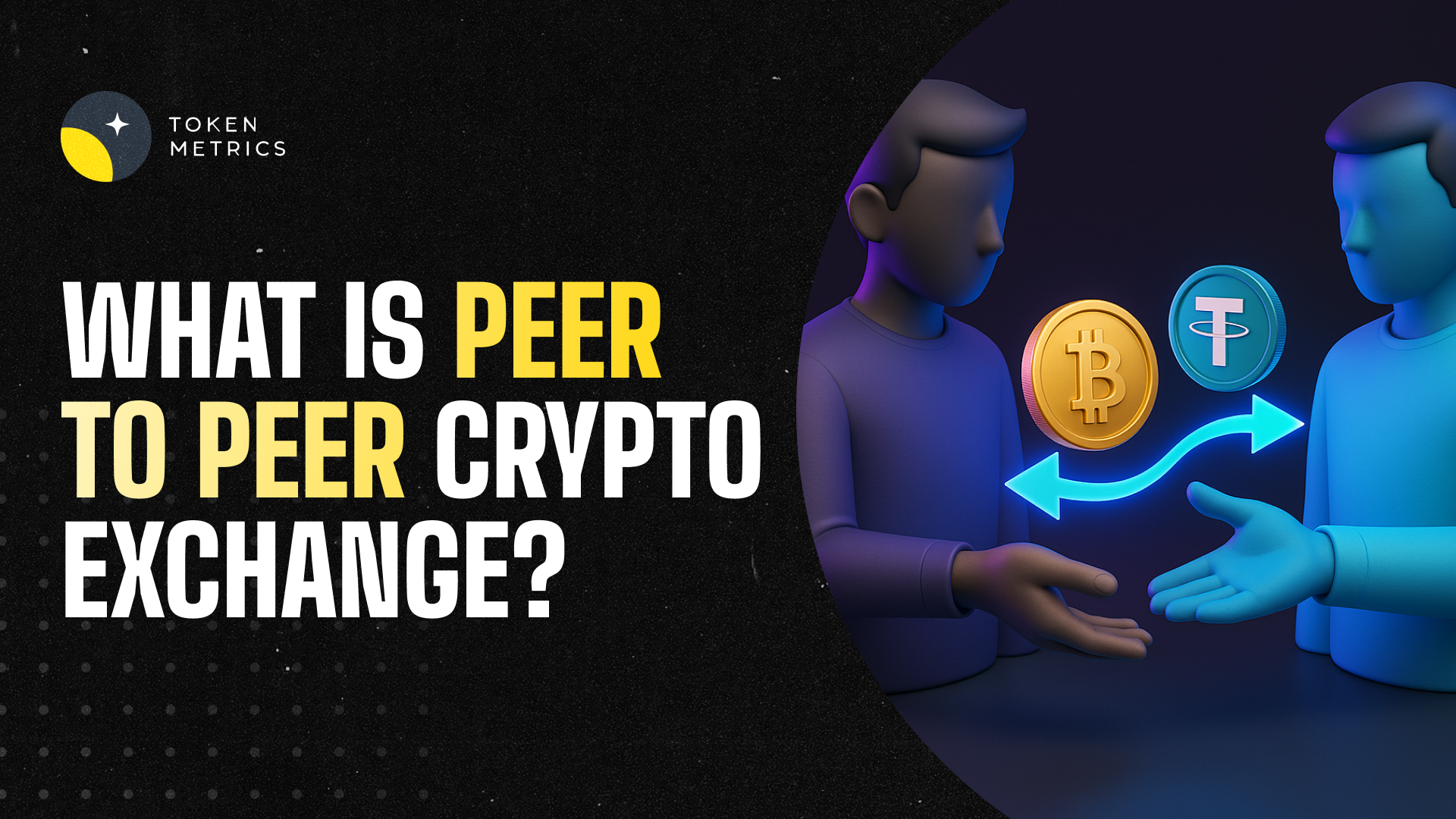
What is Crypto Arbitrage and How to Start Arbitrage Trading?

As the world of cryptocurrency continues to evolve, new opportunities for investment and profit are emerging. One such opportunity is crypto arbitrage, a trading strategy that can yield significant returns for savvy investors.
In this article, we'll explain what crypto arbitrage is, how it works, and why it's become an increasingly popular investment strategy in crypto space.
What is Crypto Arbitrage?
Crypto arbitrage involves taking advantage of price differences for a cryptocurrency on different exchanges. Cryptocurrencies are traded on many different exchanges, and the prices for each currency can vary significantly between these exchanges.
This creates an opportunity for arbitrageurs to buy a currency on one exchange where the price is low and then sell it on another exchange where the price is high. The difference between the buy and sell price is the profit.
Types of Crypto Arbitrage
There are several types of crypto arbitrage, each with its own unique characteristics and risks. Let's explore some of them.
Exchange Arbitrage - Exchange arbitrage is the most common type of crypto arbitrage. It involves buying a cryptocurrency on one exchange where it is priced lower and selling it on another exchange where the price is higher.
This type of arbitrage is possible because different exchanges have different prices for the same cryptocurrency due to differences in supply and demand, trading volumes, and market manipulation.
Triangular Arbitrage - Triangular arbitrage is a more complex type of crypto arbitrage that involves taking advantage of price differences between three cryptocurrencies on different exchanges.
For example, you could buy Bitcoin on Exchange A, trade it for Ethereum on Exchange B, and then trade the Ethereum for Litecoin on Exchange C, and then sell the Litecoin back for Bitcoin on Exchange A. This type of arbitrage requires a lot of research, expertise, and quick decision-making to execute successfully.
Statistical Arbitrage - Statistical arbitrage involves using mathematical models and statistical analysis to identify mispricing's in the market. This type of arbitrage is often used in the stock market but can also be applied to cryptocurrencies. Statistical arbitrage requires extensive data analysis and algorithmic trading strategies to take advantage of the market inefficiencies.
Inter-Exchange Arbitrage - Inter-exchange arbitrage involves taking advantage of price differences between different exchanges by buying and selling cryptocurrencies simultaneously.
This type of arbitrage requires access to multiple exchanges, high-speed internet, and advanced trading tools to execute quickly and effectively.
Cross-Currency Arbitrage - Cross-currency arbitrage involves buying and selling different cryptocurrencies denominated in different currencies.
For example, you could buy Bitcoin in USD on one exchange and sell it for Bitcoin in EUR on another exchange. This type of arbitrage requires a deep understanding of the currency markets and exchange rates.
How Arbitrage Trading Works?
The concept of arbitrage trading is based on the idea that the price of an asset can vary in different markets due to various factors such as supply and demand, transaction costs, and currency exchange rates.
The goal of arbitrage trading is to purchase an asset in one market at a lower price and sell it in another market at a higher price, making a profit from the price difference.
To execute an arbitrage trade, traders need to be quick and efficient in analyzing the markets and executing trades. In recent years, technology has played a significant role in enabling traders to execute arbitrage trades in real-time by using automated trading systems that can quickly identify price discrepancies and execute trades.
Overall, arbitrage trading is a sophisticated trading strategy that requires expertise in analyzing markets and executing trades efficiently.
How to Start Arbitrage Trading?
Arbitrage trading can be a lucrative trading strategy for those with the skills and knowledge to execute it successfully. Here are some important things to know before starting the arbitrage trading -
Understand the concept: Before starting arbitrage trading, it is essential to understand the basic concept of the strategy. This includes understanding the factors that can lead to price differences between markets and the techniques used to exploit them.
Choose the markets: The next step is to identify the markets and exchanges to trade in. This can include different asset classes such as stocks, commodities, and currencies. It is important to research and analyze the markets thoroughly before making any trades.
Analyze the markets: Analyzing the markets involves looking for price discrepancies and opportunities to make a profit. Traders need to use various tools and techniques such as chart analysis, technical indicators, and fundamental analysis to identify potential trades.
Develop a trading strategy: Once traders have identified potential trades, they need to develop a trading strategy. This involves deciding on the entry and exit points, the size of the trade, and the risk management strategy.
Execute the trades: After developing a trading strategy, traders need to execute the trades. This involves using trading platforms and brokers to place the trades and monitor them in real-time.
Monitor the trades: Monitoring the trades is an essential part of arbitrage trading. Traders need to track the prices of the assets in both markets and make adjustments to their trades as needed.
Keep learning and adapting: Arbitrage trading is a complex trading strategy that requires continuous learning and adaptation. Traders need to stay up to date with the latest trends and developments in the markets and adjust their trading strategies accordingly.
Crypto Arbitrage: Benefits and Risks
Here are some detailed pointers to understand the benefits and risks associated with crypto arbitrage trading:
Benefits of Arbitrage Trading
Arbitrage trading offers several benefits to traders, including:
- Low risk: Arbitrage trading is a low-risk investment strategy as it involves buying and selling assets in different markets simultaneously to profit from the price difference.
- High returns: Arbitrage trading can offer high returns as the price difference between the two markets represents the profit that the trader can make.
- Diversification: Arbitrage trading allows traders to diversify their portfolio by investing in different markets simultaneously.
- Liquidity: Arbitrage trading offers high liquidity as traders can buy and sell assets quickly in different markets.
Risks Associated with Arbitrage Trading
These are few risks, associated with arbitrage trading:
- Technical issues: Crypto arbitrage requires real-time monitoring of multiple exchanges and execution of trades. Technical issues such as slow execution times or system failures can result in missed opportunities or losses.
- Security risks: Cryptocurrency exchanges are often targets for cyber attacks, which can result in the loss of funds. Traders need to ensure they use reputable exchanges and implement security measures such as two-factor authentication to protect their assets.
- Regulatory risks: The lack of regulation in the cryptocurrency markets can lead to regulatory risks. Traders need to be aware of any legal or regulatory issues that may arise and the potential impact on their trades.
- Market volatility: Cryptocurrency markets are highly volatile, and price discrepancies can change quickly. Traders need to be prepared for sudden market shifts that could result in losses.
Is Crypto Arbitrage Still Profitable?
The profitability of crypto arbitrage depends on various factors such as current market conditions, trading fees charged by exchanges, speed of execution, and the amount of capital available.
If there are significant price discrepancies between exchanges, traders can potentially make a profit. However, if the price discrepancies are minimal, the potential profit margins may not be worth the effort.
Additionally, traders need to carefully consider the fees charged by exchanges, execute trades quickly and efficiently, and have enough capital to cover trading fees and take advantage of profitable trades. By continuously monitoring the markets and weighing these factors, traders can increase their chances of success in crypto arbitrage trading.
Is Crypto Arbitrage Legal?
The legality of crypto arbitrage varies from country to country. In general, crypto arbitrage is legal in most countries, but traders should be aware of local regulations and laws governing cryptocurrencies and financial trading.
In the United States, arbitrage trading is considered legal, and it is even encouraged as it helps to increase market efficiency. In addition to that, arbitrageurs play a crucial role in providing liquidity in different markets and acting as intermediaries between buyers and sellers.
It is recommended that traders consult with legal and financial experts and conduct thorough research before engaging in crypto arbitrage trading to ensure compliance with local laws and regulations.
The Bottom Line
Arbitrage opportunities are commonly found in financial markets, where the same asset is traded at different prices in various locations, including stocks, bonds, and commodities.
Since the cryptocurrency market is complicated, devising successful arbitrage strategies can be challenging. Nevertheless, the practice is legal, and it has the potential to yield substantial returns, while also exposing investors to significant risks.
With the right knowledge, research and expertise, traders can potentially benefit from crypto arbitrage and contribute to the overall efficiency and liquidity of cryptocurrency markets in 2024 and beyond.
Disclaimer
The information provided on this website does not constitute investment advice, financial advice, trading advice, or any other sort of advice and you should not treat any of the website's content as such.
Token Metrics does not recommend that any cryptocurrency should be bought, sold, or held by you. Do conduct your own due diligence and consult your financial advisor before making any investment decisions.

.svg)

Create Your Free Token Metrics Account

.png)




%201.svg)
%201.svg)


%201.svg)















.svg)




.png)